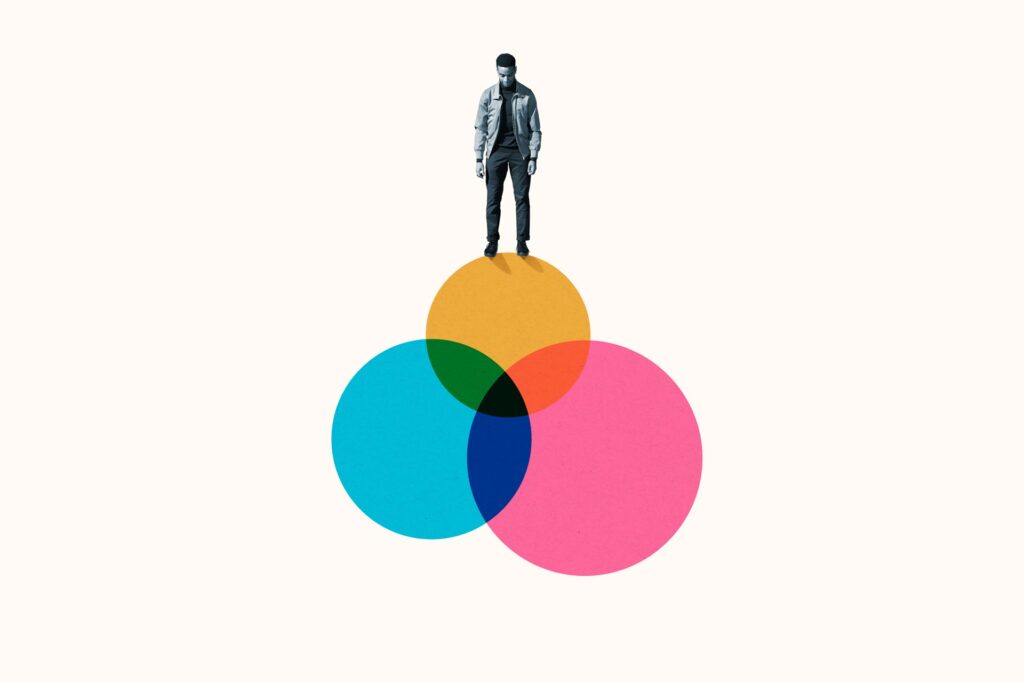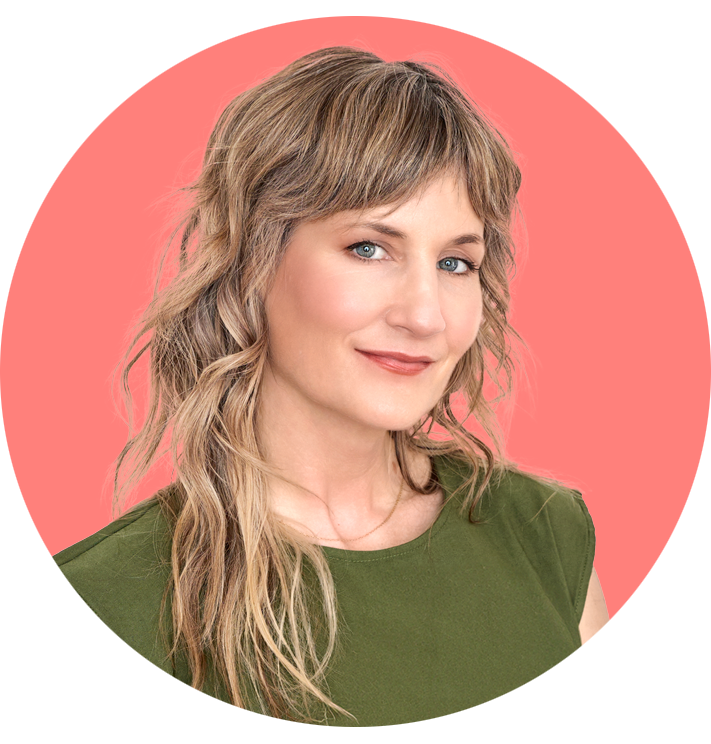
Career Coaching Questions:
What Is Emotional Intelligence?
What is emotional intelligence? The simple definition of emotional intelligence is the ability to 1) understand how you’re feeling, 2) know how to manage your feelings in healthy ways, 3) understand how others are feeling, and 4) know how to respond to the emotional reality of others in constructive ways that strengthen relationships. There’s a lot going on there, and I’m sure you’ve experienced what it feels like to be close to someone who’s not great at this — we all have.
Have you ever had a friend who would make insensitive comments, only to be taken aback when your feelings were hurt? Or a family member who gets so stressed out they explode (or get weird and passive-aggressive, or shut down altogether?) Maybe you’ve dated someone who rarely shared their feelings, and seemed uncomfortable or inept around yours. Or how about that boss who’s so fixated on goals and timelines that they don’t understand why you want to quit your job (and pull the fire alarm on the way out the door.)
Chances are, your friend, family member, your boss, or your partner all have opportunities to build emotional intelligence. But what is emotional intelligence? And why is it so crucial to our lives?
Emotional Intelligence: Why it Can Matter More Than IQ
Emotional intelligence, or EQ, is the ability to recognize and understand your own feelings, and to connect to, understand, and care about the feelings of others. Emotional intelligence in personal relationships — whether as a partner, friend or parent — makes all the difference between smooth sailing and ongoing frustration. Emotional intelligence at work is the key to a positive environment and collaborative productivity. EQ is the elusive secret sauce that makes things feel either very easy or very difficult — but people often don’t know why.
People high in emotional intelligence tend to be good listeners, adept at regulating their own internal states, and naturally empathetic (meaning that they understand accurately, how other people are feeling). People with lower emotional intelligence may be cut off from their own feelings, oblivious to the feelings of others, and may have a hard time communicating their own emotional needs effectively. They may not even be aware they’re having emotions at all. Alternatively, they may be prone to emotional flooding, and not know how to calm themselves down.
Even though someone can be extremely intelligent in other ways — good at solving practical problems, know a lot about many things, have a great memory, and more, they can still be missing a lot if their emotional intelligence is not as well developed. They can lash out at people, not understanding the extent of the damage they’re causing. And, unfortunately, the things they don’t understand about themselves and others are often the most important and consequential aspects of what’s really going on.
Emotional Intelligence and Healthy Relationships
When we struggle with emotional intelligence, healthy relationships don’t come easily. Communication is difficult when people don’t understand how they feel, much less what their partners are feeling (or how to talk about it). Ironically, people low in emotional intelligence may seem quite emotional — even angry or explosive.
Trying to figure out how to communicate with a withdrawn partner is just as damaging as living with someone who’s always angry: Neither way of being creates the emotional safety necessary for successful relationships. If we haven’t yet spent time and energy on developing our emotional intelligence, our partners may feel that they can’t really get close to us, they may feel invalidated, and they can’t rely on us for emotional support. The relationship feels insecure to them.
Often, a big part of successful marriage counseling, couples therapy, or relationship coaching involves helping couples learn emotional intelligence skills, which natural helps them become “good with people” (including their partner).
Emotional Intelligence in the Workplace
At work, managers with low EQ may treat their subordinates more like output machines than human beings with lives and feelings, leading to resentment and burnout. Lower-level employees may fail to form good working relationships with management and may plateau in their careers and not know how to get unstuck, despite technical skills and talents.
The benefits of emotional intelligence are enormous. The good news is that emotional intelligence, unlike IQ, isn’t fixed throughout our lifetimes. A good emotional intelligence coach or counselor who specializes in relationships can help you strengthen your EQ by building your awareness of your own feelings so that you can more easily plug into the feelings of the people around you.
This work leads to deeper relationships, greater trust, and an improved ability to handle stress and conflict so that you can love your work. At this point, the benefits of EQ are so well recognized that high-level executives often seek out emotional intelligence training for leaders to become more effective managers and mentors.
Examples of Emotional Intelligence
We humans are emotional creatures, and we have fast feeling parts of our brains as well as slow thinking parts of our brains. Both are important, but they generate different experiences. For example, I’ve just spent some time talking to the thinking part of your brain. I’m giving your information about emotional intelligence: what it is and why it matters. The benefits of EQ, and the problems people face without it.
Intellectual discussions and informational articles are great, but as an exercise in emotional intelligence, let me talk to the feeling part of you for a little bit. Allow me to tell you a few stories about emotional intelligence in action.
Emotional Intelligence at Work — A Story
I met Aaron three months ago, but he didn’t meet me. Not exactly. When he first arrived for career counseling, Aaron hustled into my office with a scowl on his face. Instead of “hello,” he greeted me with an elongated grunt that seemed to communicate “I am in a hurry,” and “I am in a very bad mood.”
During that first 45-minute session, he never made eye contact, not once. After 20 years as a counselor and career coach, I’ve met lots of people in bad situations. The therapist part of me wondered if Aaron’s surface rudeness was a mask for deep emotional pain, and I was curious to learn how I could help.
But to Aaron, his problems didn’t seem so deep. Armed with intelligence, confidence, and a degree from Stanford, Aaron was deemed a “superstar” when he joined a top Denver consulting firm three years ago. Assigned to a managing partner on one of the firm’s most lucrative accounts, Aaron seemed poised to win at work.
The fizzle started so quietly, that Aaron barely noticed. After six months, his mentor moved to a different account but declined to take Aaron with him. His new boss assigned Aaron to a smaller account. Similar demotions followed. His latest boss — was it his sixth? Seventh? Aaron had lost count — suggested that perhaps Aaron should work elsewhere.
“Have you looked in New York City?” Aaron’s manager said. “Consultants there can get away with being a bit more . . . aggressive. That might be a better fit for you.”
Aggressive? What was this guy talking about? Aaron had no idea. He had given the partners everything — deep research, skillful analysis, long hours. From his perspective, he was doing a very good job, if anything, he was consistently going over and above. Now they wanted him gone? They must be morons.
“I’m hearing that you’re pretty angry about this,” I told him. “I’m not angry,” Aaron said, smirking at me like he thought I was a know-nothing moron too. His fists were clenched, his jaw was tight, his face was red. His entire body radiated rage. Yet Aaron’s mind was convinced: He definitely was not angry. “I just wound up at the wrong company,” he said. “Now I need to plan my next move.”
“Great,” I said, “Tell me more about this and we can discuss some career moves.”
Pausing for an aside here: I personally, just like everyone else, have work to do in the emotional intelligence department. However, from my many years of experience as a counselor, and as someone with relatively well-developed EQ, I know things at this moment that may seem counterintuitive, but that are in fact, the right thing to do.
I was pretty sure that the partners at Aaron’s firm aren’t morons. Rather, through indirect words and actions, everyone was telling Aaron the same thing: We don’t like working with you. Sure, Aaron is smart, hardworking, and talented. But he was totally oblivious to his own feelings and the feelings of others.
Part of how I understood this was because I was aware of how I was feeling about Aaron in that moment. I felt his contempt for me, I felt like I needed to walk on eggshells with him, and I was very aware that there was a disconnect between what he was showing me about how he felt, and what he was saying.
And, because of the work I’ve done in this area, even though I could feel my own reactions, it’s pretty easy for me to make note of them and take information from them, but not get anywhere close to emotionally elevated myself. I didn’t take Aaron personally or feel bad about the interaction any more than I’d feel upset because it was a cool day and I needed to grab a sweater. It’s just information that informs action.
I also understood, through my own emotional intelligence and ability to manage relationships effectively, that if I tried to directly confront Aaron or make any effort to “convince” or tangle with him about what the real problem was it would damage our developing relationship. He’d reject me and blow out of counseling. I needed to spend a lot more time on Aaron’s side of the table and move slowly, gradually and experientially, and with a great deal of empathy, helping him unfold his own experience so that he could eventually come to understand himself and the nature of “the issue” differently.
My goal with Aaron was to build a strong relationship with him. He needed to trust me, and feel understood by me. He had thick, high walls around him, and if we were going to do any real work at all, it was going to be from me slipping through a window — not going through the front door.
I settled in for what I anticipated to be many weeks, possibly months, of talking with Aaron about his issues from his perspective, talking about other jobs, talking about what jerks his coworkers are, talking about anything he wanted… Over time I could build a strong relationship with him, and use my emotional intelligence to jiggle at the windows and feel for secret passages into the fortress. With time and earned trust, I would have opportunities to help him gain awareness about his emotional process and make real and lasting changes.
Emotional intelligence gave me a ton of insight into me, into him, into the issue, how to manage this relationship, and what the most effective course of action would be. But it was the exact opposite of the obvious, surface-level, “rational” response that makes sense logically. If I hadn’t had the emotional intelligence to inform me, I could have easily destroyed any hope of helping Aaron in a significant way.
Emotional Intelligence: More Than a Twitter Fad
In the world of career coaching and executive management, the term “emotional intelligence” has circulated for decades. It didn’t hit the mainstream press until early 2018, after a spate of academic articles showed how improved emotional intelligence can predict everything from brand loyalty to ethical behavior, to lower levels of social anxiety among adolescents.
Building emotional intelligence can increase motivation, productivity, and collaboration, and can prevent toxic workplace dynamics from taking over.
Next, the theory became an acronym – “EQ” as opposed to “IQ” – enabling marketers to run clickbait Twitter ads offering to “Test your EQ.” Then, because every fad dies, EQ died.
Yet here I am, writing about emotional intelligence anyway. I’m doing it because I believe emotional intelligence is the most powerful tool to bring love, happiness, and success into our lives. And it’s WAY more complex than a two-letter acronym.
If you’ve read this far, you’re probably aware of emotional intelligence as a concept. Perhaps your partner or coworker has suggested you might benefit from emotional intelligence work.
The problem is that, for many people, the mere suggestion that we might need to improve our emotional intelligence makes us angry. Often, that anger covers difficult feelings of shame. It’s painful to hear that other people don’t like us. Asking the critical question, “Why?” takes courage. It’s easier to respond like Aaron did, and dismiss our critics as jerks or fools. In a strange way, Aaron was lucky. Most people who struggle with emotional intelligence never have a boss or partner who’s willing to mention it, much less land in the office of an emotional intelligence coach.
This is the Catch-22 of emotional intelligence: The people who need it most are often the last to know they need it at all.
Strengthening our emotional intelligence is hard work. It’s a process, and it takes time. It may require expert help from a professional coach or counselor, someone trained in applying theoretical frameworks to the details of everyday life, and that will cost a little money. All of which makes the reasonable person ask: Why bother?
Because emotional intelligence may be the most effective tool to understand ourselves and the world around us. With work, its lessons can improve every sector of our lives — not just our careers, but also our friendships and romantic lives, even our relationship to ourselves. For most people, a short investment in emotional intelligence pays off in decades of improved connection.
What follows is an introduction to emotional intelligence theory, how to get help applying it to your life, and why this may be the single most important investment you’ll make in your own personal growth.
Let’s Talk.
Schedule a Free Consultation Today.
Emotional Intelligence and the Peephole of Awareness
Maybe the hardest thing about emotional intelligence is realizing when it’s lacking. Like Aaron, most people who struggle with it can’t even see it.
Others don’t know what all the fuss is about. Recently I met Jane and Jared for marriage counseling. Both agreed their problems were stubborn but simple: They wanted better communication, more sex, and more quality time together. Easy!
But by our second online marriage counseling session, I was beginning to see their problems ran deeper. Jared had a difficult time naming what he liked about Jane, their relationship, their neighborhood, or anything about his life. He blamed their relationship problems on work — both had demanding jobs that were straining their relationship. As he talked, Jared stared off into the middle distance, avoiding eye contact with me (on his laptop’s camera) and with Jane, who sat beside him on the couch.
Meanwhile, Jane admitted that she often avoids moments that could turn intimate, either emotionally or sexually. Jared often seems grumpy or distracted, Jane said. That made it difficult to initiate holding hands or going on a date, things that could stimulate better intimacy.
“You never talk to me. You don’t care. I have a better time with my friends, with them I can at least have a conversation.” Jane said. “I’m sorry,” Jared responded, “but I just don’t know what you’re talking about.” Jared wasn’t being defensive. And he wasn’t trying to be a jerk. He genuinely didn’t know what Jane meant.
I spotted my opening, and I took it. I began to explain to Jared and Jane the theory of emotional intelligence. It starts with the understanding that the world is an infinite array of neutral information — things, people, smells, and colors. But our consciousness functions like a peephole, blocking most of that information from entering our awareness.
Rather than glimpse the world in all its color and complexity, the peephole of our awareness goes looking for the most important thing it can find: Immediate threats to our survival. No surprise, it finds such threats everywhere it looks.
For Jared, the threats were few but powerful: Deadlines! No time to relax! And now: A partner who says she’s feeling distant! None of these factors posed a threat to Jared’s life. But they sure felt like it. Each felt like a tiger stalking Jared through a jungle. Jared found escape by switching off his brain, acting distant, and feeling numb.
Jane, being an emotional creature too, didn’t know how to respond to this in a way that would help improve the situation instead of making it worse. She thought that she was just having a natural reaction to Jared, not realizing that her responses to him (annoyance, resentment, criticism) were impacting him and making it harder for him to fight through his triggers to connect with her. (Here is an article on evidence-based practices and family systems, if you care to learn more).
This is the subconscious trance we can all fall into, not being aware of what’s really going on under the surface of ourselves, much less others (or how to manage it on either side). For most humans, it is our baseline condition, and it’s totally natural. It happens because our brains evolved over millions of years under conditions of perpetual threat and trauma — the threat of death (from lions, drowning, snakes), and the need to prioritize strong attachment bonds above all else. Our emotional minds are therefore much stronger and faster than our thinking selves… but those two sides are often disconnected from each other.
The problem with the trance is wrapped up in our success as a species: The human condition evolved faster than the human mind. Most people don’t get stalked by tigers anymore. But the powerful structures in our minds and bodies responsible for instantly sensing danger are just as robust. Unfortunately, the apertures of our conscious awareness remain so tiny, that we can’t turn that gaze inward without support.
To increase our ability to understand ourselves and others accurately, we must widen the apertures of our awareness. We must learn to take in more information about the world. That process starts by taking in more information about ourselves.
Building Emotional Intelligence: First, Feel It
Normally I don’t like to contradict my clients. But in Aaron’s case, he was wrong. He wasn’t just angry. He was livid. I knew because his clenched face and fists told me so. But Aaron was so disconnected from his emotions and his body that he genuinely had no idea.
So I waited, built up a relationship with him, and used my EQ to sense when it would be helpful, or even possible, to go deeper. (Friends, it took a while). Then, during one session, as Aaron was venting about his continued frustrations, I asked him to close his eyes and picture his first boss, the managing partner who hired him, then rejected him.
Aaron’s right fist clenched immediately. So I asked Aaron to take stock of his body, starting with his toes. Did they feel warm or cool? Could he feel my office floor beneath his feet? I directed Aaron’s attention up his body, ankles to knees, belly to shoulders, arriving finally at his hands. Could he sense the weight of his fists? Could he direct his attention inside his fists, as if feeling them from the inside out? What did his fists have to say?
A growl emanated from Aaron’s mouth, longer and lower than the grunt that served as his “hello.” Good, I said. Tell me more.
“I don’t want to punch him,” Aaron said of his boss. “I do want to punch the wall in his office. It’s so unfair. I work my tail off! Why doesn’t he like me anymore?”
Bingo. Aaron’s mind was telling him to go find a new job, one with smarter bosses. His body was screaming something totally different: My tribe has ostracized me. Now I feel anger and shame. This information was carried in his body, which Aaron’s education at one of the world’s finest universities had trained him to ignore.
This is where the peephole of awareness comes in handy. We’re usually so disconnected from our own internal experiences that it’s hard to even know we’re having them in the moment. But when we slow down and think about it, it’s all available.
If you’re wondering what I’m talking about, try it now. Start by focusing your attention on one extreme of your body — your toes or the crown of your head. Start to move your attention slowly up or down, feeling the temperature of each individual part, the gradations of ease and tension. As your awareness flows, it will naturally come to rest in places with pent-up energy. These spots may feel especially tight, clenched, pulsing, or hot.
Pause. Go deeper. Inquire. What’s this physical sensation like, really? Is it painful? What does it have to say? Don’t overthink it. Just ask the questions. If an answer leaps out, and it probably will, that’s the right answer.
When I did this with Aaron, he felt rage. Probing deeper, he felt sad that his earnest efforts to do a good job were going unappreciated. This exploration made the connection, finally: His conscious mind, his “thinking self,” was aware of the sensations and put language to them. They were now real. They were now something that could be dealt with.
When I did this with Jared, sitting at home on his couch, he said he felt pressure in his thighs. Underneath that vacant stare, he wanted to walk, to jump, to escape his job and relationship, the constant pressure to deliver things he didn’t understand. Next, we focused on Jane, who felt pressure in her throat. She wanted to tell Jared how he made her feel unseen and unwanted, but she worried that if he told him this he’d invalidate her and tell her she was wrong for feeling that way.
Jane admitted — just realizing it for the first time herself — that it was easier and more comfortable to feel angry and powerful than it was to be vulnerable with Jared. To his credit, Jared heard that. For the first time, he felt the reality of how Jane was feeling. It was the first time she’d said that to him, and it made him sad. Being aware of that sadness made him want to connect with her, and comfort her. Jane was aware that she wanted that from him. The healing had begun. Not because of what they knew, but because of their awareness of how they felt.
In each case, Jane, Jared, and Aaron carried critical data in their bodies that wasn’t getting shared with their brains. This disconnect caused them to behave in ways that hurt them: Aaron by communicating rage he wasn’t even aware of; Jared by perpetual emotional numbness that led to disconnection from the woman he loved; Jane by trying to get her emotional needs met through anger and criticism, rather than the openness and vulnerability that would actually allow her to get it.
Intellectual intelligence starts in our minds. Emotional intelligence starts in the body. Training our awareness to find spots of pent-up feeling in our bodies, and paying attention to what those somatic feelings tell us, is the crucial first step toward greater emotional intelligence.
I’ve been doing this work for years. To be honest, I still find it hard. Our automatic responses like anger, distraction, or neediness are sticky because they’re hardwired into our brains, yet, because they are so fast and automatic, they are so difficult to become aware of. Many people need external support to gain the self-awareness required to understand what is happening to them and know what to do with it.
I personally have spent a lot of time in counselor training and my own personal growth work to achieve this, and to this day, do a lot of writing and journaling to help me stay connected to my emotional self so that I can be of service to others on the same path of growth and self-discovery.
Let’s Talk.
Schedule a Free Consultation Today.
Emotional Intelligence and Managing Our Internal States
Aaron wants to punch a hole in his boss’s wall. Jared wants to avoid. Jane wants to scream.
Knowing these impulses is really important. Acting on them is dangerous. Jared’s drive for escape could cost him the relationship he loves. Jane’s need to yell captures her pent-up anger at Jared, but not her pent-up love. Aaron’s desire to explode could get him fired.
What’s needed is balance. We must recognize our feelings, but we mustn’t let them overpower us. Thanks to decades of research on emotional intelligence, we have some well-established tools to help us do both. One of the best is called self-soothing, and it can take many different forms. Some people prefer a meditative route, such as repeating a calming mantra like “I am loved.” Others take a more intellectual path, as suggested by cognitive therapies. They might hold the negative feeling in their mind and then ask, “Is this true? Am I sure it’s true? Is it possible that it’s false?”
Spoiler alert: It’s often false. But the practice is helpful in reducing fear’s grip. Even a sliver of doubt can separate us from compulsive feelings, and give us the opportunity to view them in a clearer light. Building up this habit can be tricky, however. A counselor who’s trained in the self-management techniques of emotional intelligence can help find the practices that work best for you.
But honestly one of the very best ways of managing your internal experience is by developing a completely different relationship with it — and stop trying to change or control the way you feel. Acceptance and commitment therapy techniques are evidence-based, and very effective in helping you understand what you’re feeling and why, and how to respond to feelings in ways that are healthy and helpful — both for you and for the people you love.
In fact, all good therapy attends to feelings, and evidence-based coaching does too. There are many roads that lead to Rome, and you can learn more about evidence-based approaches to personal development (and professional development) here.
Emotional Intelligence and Healthy Relationships
Building emotional intelligence requires developing awareness of ourselves, and learning how to manage it. But there are two more components of emotional intelligence skills that are just as important — essentially, taking the lessons we’ve learned about ourselves and applying them to other people. This begins with building our awareness of other peoples’ thoughts and feelings.
To do that, first we must quiet ourselves. (In this model, the steps of emotional intelligence are not sequential. Once we learn the four basic steps, we’re constantly bopping between them, honing our abilities as needed.)
During our first few months of working together, Aaron was so consumed with buried rage that bringing his anger into the light of his awareness consumed all our time and focus together. Only then could he realize: “My God, this must be really difficult for other people to live with. Imagine a coworker who often seemed ready to blow up, but never expressed what he was so angry about. Whenever I meet people like that, it makes me super uncomfortable!”
To his credit, Aaron u never intended to scare anyone. The truth is that deep down, like everyone (yes, even men) wants emotional intimacy with others. Before we met, he simply had no idea that he was even angry! Working as his coach, I gave Aaron an assignment. For the next week, I asked him to go to work but speak as little as possible. His job was to pay attention with his eyes and ears. How did his coworkers get along? Were they uptight? Easygoing?
Most important: How did those group dynamics change when Aaron entered a room? Did people speak more quietly? Did they scatter? Did anyone approach him? The goal wasn’t to make Aaron paranoid. It was to shake him gently, get him out of his head, and encourage him to consider his impact on the people around him.
As I suspected, when Aaron returned the following week, he was surprised by his findings. He noticed for the first time how most of his coworkers clammed up with him around. The few who approached were mostly the ones Aaron didn’t like, gregarious emotionally intelligent salesmen skilled at talking to all different types of people easily — even hard cases like Aaron.
This was a painful thing for Aaron to realize. But because his behavior was so difficult for others to bear, at least its effects were fairly obvious. Most people who struggle with emotional intelligence do so with more subtlety, in relationships and offices where the unspoken communication is nuanced and harder to read.
These are cases where a professional coach who’s trained in emotional intelligence can really help. At Growing Self, our counselors can help clients distinguish between normal, random clashes at work, versus patterns of behavior that systematically alienate others. Since most people won’t come out and tell us how they feel, learning to read subtle cues is a crucial step toward happiness in our careers and personal lives.
Emotional Intelligence and Managing Others
Our power to manage the feelings of others is limited. The best we can do is be truthful and appropriate about expressing our own feelings, and empathetic when others express theirs, even in subtle, nonverbal ways. But people are always going to run their perceptions of events through their own internal filters, and even if we’re working very hard to convey positive regard and our best intentions, we cannot, ultimately, control how others feel.
But, there is an awful lot of runway and opportunity between what is locked inside other people’s heads and how we can intentionally behave. When we’re aware of ourselves and others, and consciously engaging in pro-relationship behaviors that take the feelings of others into account, we have a much higher chance of having positive outcomes than not.
The way we develop those emotional intelligence skills is unique to each individual, but for many, professional emotional intelligence coaching can really help. For Aaron, it involved a few months of one-on-one coaching work. We focused on strengthening his ability to recognize his own feelings and being able to get himself to a softer place internally.
Only then was Aaron ready to start focusing on other people. After monitoring the ebb and flow of workplace morale, he decided to approach the firm’s lead partner in person. With a little coaching from me, Aaron crafted his message carefully: That after some personal reflection, he realized he often came off more gruff and angry than he’d realized. It was never his intent to hurt anyone’s feelings. In the future, Aaron promised, he’d do a better job communicating his true feelings: That he valued excellent work, liked his coworkers, and respected their skills.
Aaron was being uncomfortably vulnerable during this conversation, but to his surprise, his boss responded with openness and vulnerability in return. “You know Aaron, I’m so happy to hear that. I’ve sometimes felt at a loss for how to help you be truly successful here. You do such great work, and I see so much potential in you. I completely agree that smoothing out the rough edges is the key to your success in this environment. It might take a while to earn trust back, but I am here to mentor you if you’ll allow me. I’m really proud of you for doing this work Aaron, and I’m so glad we’re having this conversation today.”
Aaron left his office feeling a little stunned and uncertain but feeling hopeful too. It was a real growth moment for him, and potentially a major turning point in his career too. He had a completely new story about what was happening at work, but also a new direction for where to go from here. It’s going to take a while of very consistent and deliberate practice for Aaron to slowly change the narrative of his colleagues about who he is (after all they’ve known him as “The Powder Keg” for years, but he’s on a good trajectory.
Interestingly, through this work, Aaron became much less concerned with his being on some “superstar” track and much more focused on how much he enjoyed the work itself. He was somewhat surprised to find that the times he actually felt best about his work, and himself, were when his efforts were having a positive impact on other people. Go figure.
Getting Help with Emotional Intelligence
As I’ve mentioned, emotional intelligence coaching is complicated work. It’s easy to get lost, either in stored-up feelings or in the somatic experience of sorting those feelings out.
What’s more, this process never ends. Rather, it’s actually designed to repeat itself. Every time we confront something challenging, whether our own feelings or someone else’s, we return to the commandment of first connecting to our own feelings. Only when we’re grounded in our emotions can we treat others well, and give them the attention each of us needs to feel safe in our relationships.
The fact that it’s complex and repetitive means emotional intelligence often requires a little help. Like Aaron, the people who need this work most are often the last to know it. Even those of us who’ve spent years honing our emotional wisdom can get trapped in the cage of our old, automatic core beliefs without even realizing it.
Self-awareness is key, and that is very difficult to create without a partner to shine the light on your blind spots. Finding a professional to help you through this process can be invaluable. If you’re interested in pursuing greater emotional intelligence, here are some questions to ask a prospective coach or counselor:
- Are they trained? There’s no specific degree or licensure for emotional intelligence coaching. But most people who are serious about it have taken classes in the subject, or done postgraduate training or certification programs, and are conversant in theories advanced by leaders in the field. Coaches and counselors who are experts in emotional intelligence work usually mention it in their personal bios.
- Do they make sense? If you’re trying to find a therapist, or find a career coach, or find a marriage counselor who can help you build emotional intelligence, all the coach or counselor before your first session to sound them out. Ask them: What’s your approach to emotional intelligence work? If their answer makes sense, great. If what they say doesn’t sound even remotely like the things you’ve learned about here today, it might be a sign to keep looking.
I know, there’s a lot here. That’s because I think emotional intelligence may just be the master key, the single most effective route to all-around happiness. So I wanted to do it justice.
If you’d like to learn more, here are some additional articles and podcasts on emotional intelligence for you to enjoy:
- The Impact of Emotional Intelligence
- Leadership Coaching: How to Raise Your Emotional Intelligence
- Stocking Up on Emotional Intelligence
- Podcast: How to Improve Emotional Intelligence
- How to Be More Vulnerable in Relationships
- Becoming Emotionally Healthy
- How to Stop Beating Yourself Up
- Empathy: The Key to Connection and Communication
- And so much more on the blog at GrowingSelf.com, and on the Love, Happiness and Success Podcast
Thanks for taking the time to read through all of this. I hope learning about emotional intelligence has been helpful to you!
Your partner in growth,

Dr. Lisa Marie Bobby is the founder and clinical director of Growing Self. She is a licensed psychologist, a licensed marriage and family therapist, and a board-certified coach, as well as the author of “Exaholics: Breaking Your Addiction to Your Ex Love,” and the host of The Love, Happiness & Success Podcast.
Meet a Few of Our Emotional Intelligence Coaches
The therapists, marriage and family therapists, and career coaches of Growing Self have specialized education and training and years of experience in helping people achieve their personal and professional goals. We use only evidence based strategies that have been proven by research to help you get clarity and direction, have better relationships, feel happier, and design your ideal life.
This website is devoted to your wellbeing, and offers loads of free information and actionable advice that you can start using today to create positive change in your life. Browse around to meet our experts, get free advice on our blog, listen to a podcast, or take our “How Healthy is Your Relationship” quiz. Or, if the time is right, you can schedule a free consultation with any of us to talk about your situation — and, most importantly — your hopes for your future.
What Should I Do With My Life?
Figuring out what to do with your life can feel overwhelming, especially when you have lots of options. Here’s how to get clarity and direction…
Why “Holistic” Career Coaching?
“Holistic career counseling” takes all of your life goals into consideration when crafting your career path. Why this matters…
Professional Development
Choosing a career and getting a job is only the beginning. Professional development helps you continue to grow and thrive. Learn more…
What is Emotional Intelligence?
Emotional intelligence can make or break a career (not to mention a marriage). Read “what is emotional intelligence” to learn why EI is so important on the job, and off — and how to develop it in yourself.
What is a Career Path?
Career pathing refers to the process of mapping out your professional trajectory, step by step, and into the future. Here’s how to make “career path planning” work for you…
Leadership Development
Moving into a leadership role often requires an entirely different skill set than the one that led to your original success. Want to grow into a great leader? Learn about leadership coaching.
Choosing a Career
Deciding on a career is a major life decision that requires deep insight into yourself, in order to create a satisfying career in alignment with your passion and your values. Learn how to choose a career…
What is a Career Coach?
What does a career coach do? What to expect in career coaching? What are the different types of career coaches? All is revealed in, “What is a career coach?”
How to Find a Career Coach
Not all career coaches are the same in terms of their training, expertise, or capacity to help you in specific situations. Here’s what you need to know about finding the right career coach for you…
How Much Does a Career Coach Cost?
Great career counseling is priceless, but the cost of a career coach can range from free, to thousands, depending on your goals and the type of coach you choose. Learn about career coaching costs, right here.
Does Insurance Cover Coaching
Does insurance cover coaching? Is there such a thing as “coaching insurance?” Here’s what you need to know about health insurance and coaching…
Gift Career Coaching
You can support a loved one through their career exploration and professional growth work by gifting them career coaching with an expert career counselor. How to gift career coaching…
Career Coaching Services
We offer many career coaching services to support your career development including Denver career coaching, online career counseling, leadership coaching, emotional intelligence coaching, and more.
Resume Writing Services
While our specialty is in-depth career counseling for personal growth and professional development, we also offer resume writing services and interview coaching. Learn more…
Solution Sessions
If you’re looking for quick career advice about a specific situation, consider a one-time solution focused coaching session to get clarity and direction. Learn about “solution sessions.”
The Success Collection
Our career counselors are here for you. Browse The Success Collection for their best career advice in our blog and podcasts.
More Questions? Let’s Talk.
We’re available by phone, email, text and chat, and happy to answer any of your questions personally. Get in touch, anytime.
Start Career Coaching
Ready to begin career coaching with Growing Self? Schedule a free coaching consultation with the coach of your choice. Start here.































